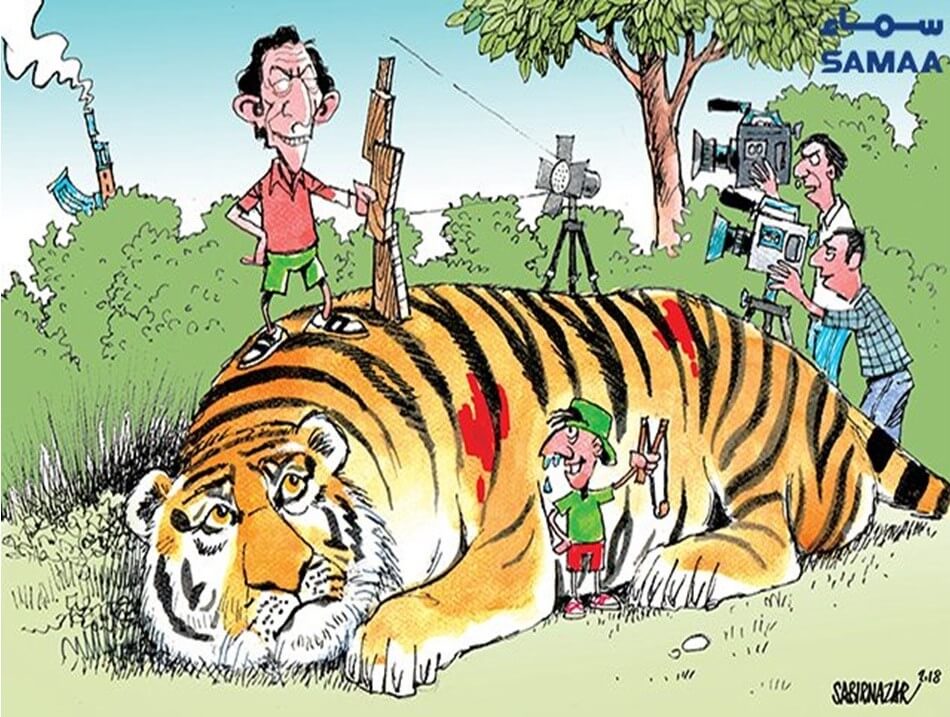
Pakistan Riding the Taliban Tiger
Sat, 04 Sep 2021 | Reading Time: 6 minutes

“He who rides a tiger is afraid to dismount” – Chinese Proverb
The accepted Westphalian sovereign international order of State responsibility and westernised societal behaviour stands threatened by the rise of revisionist states operating with sponsored non-state entities to create political disorder. The resultant volatile global situation is further accentuated by transnational radicalism supporting anarchist groups occupying large geographical areas, especially so in the Afpak region.
While examples of the phenomena are peppered in history, it is only in the last four decades that coherent results, though in various forms and degrees, have been achieved by the perpetrators. Be it Iraq, Syria, Egypt, Crimea, Pakistan or Afghanistan, anarchist ideological groups with an amorphous structure have captured geographical entities which become a Petri Dish for ideological and social experiments.
Though the established Caliphate in Iraq/Syria may have been still born, it did show a glimpse of events to come. More significantly, it exposed the resolve and responses of the World Powers to a Machiavellian Pakistani deep state, with an existing fully equipped theological laboratory in the vicinity which could be activated with a furtive push in order to accomplish multiple goals.
It is necessary to analyse the motivation of Pakistan to nurture a venomous snake in its backyard which has the potential to spread across the Durand Line. However, in the mid to long term the strategic and economic benefits expected to accrue from a Taliban ruled, Pakistan controlled Afghanistan would far outweigh the dangers for the people of Pakistan, as Pakistan will not be able to dismount the proverbial tiger.
The Great Game authored by Pakistan
Pakistan was created as a by-product of the Two Nation Theory and to this day vies for validation and identification. Promise of a superior political, economic and social nation for Muslims of the subcontinent is still to be realized specially vis a vis India, thereby calling into question the very raison d’etre for creation of Pakistan. The establishment, having failed to provide social welfare for the citizens, seeks to position itself as a protector of “Islamic Ideology” of the world, to justify their rule. Promoting the Taliban internally as well as in the international forums reinforces Islamic credentials of the Pakistan deep state and the Army.
Pakistan Army rules the country either directly or through proxies, thus has a carte blanche over foreign and defence policies while also retaining a dominant position over economic affairs. The perceptible threat to domestic power for the Pakistan Army is from radical political parties on one end and the numerous terrorist organizations, created and nurtured by the ISI.
Blockades by Khadim Rizvi led Tehreek-e-Labbaik supporters served as a reminder to the Pakistan Army of the political support and euphoria which can be generated by these fringe groups amongst the illiterate radicalized masses. Pakistan’s establishment wants to portray itself as a religious entity, seeking to de- hyphenate with the US led GWOT, providing overt support of the takeover of Afghanistan by Taliban.
Conversely, Pakistan Army is cognizant that it requires US grants to bankroll its arms race against an economically superior India as well as to assist Pakistan’s battered economy to remain afloat. Total disengagement of US from Afghanistan would stop the cash flow from US Military (overland logistics) as well as significant slush funds from the State Department/ Intelligence Agencies. Moreover, reduced US dependence on Pakistan would enable India to exert enhanced international pressure over terrorist groups operating from Pakistan. Therein lies the need for Pakistan to keep the USA engaged in Afghanistan through their self-professed “over the horizon” counter terrorist operations.
Now that the Taliban 2.0 has been declared as reinvented and pure, a new enemy in the form of ISIS-K (Kabul Airport Blasts) is propped up with ISI as an arbiter which decides the difference between the two in return for cash and influence. With no boots on ground, the US military will have to fall back on ISI to combat this hitherto unknown terrorist organization on which essays are being published within hours of the blast.
CPEC investments from China are hugely publicized as a panacea for all ills in Pakistan’s economy. However, the money has dried up largely due to unviability of projects as also because of precarious security situations in Baluchistan and Khyber Pakhtunkhwa, wherein Chinese nationals are being targeted. Pakistan hopes to tap the substantial mineral wealth of Afghanistan, through control over various factions of Taliban, with China as a readymade customer.
Moreover, by publicly revelling in embarrassment of the US military during the chaotic evacuation from Afghanistan, Pakistan pays unapologetic obeisance to its new master, China, which is locked in a power struggle for global dominance with the USA. China now seeks control of the Bagram Base vacated by the US, through a perceived Pakistan controlled Taliban.
Prognosis
Pakistan has long peddled the narrative of strategic depth against India as a justification for dominance over Afghanistan. Though without strategic rationale it was perceived as an understandable ploy in the perpetual Indo- Pak rivalry. Indian investments in infrastructure and educational scholarships have earned the goodwill of the people of Afghanistan but are bereft of any leverage as it lacks proximity as well as religious and ethnic affiliations.
A Pakistan controlled Taliban enhances the strategic relevance of Pakistan, as most roads leading to Kabul (Taliban) go via Rawalpindi. The motivation of Pakistan for meddling into Afghanistan remains domestic, political and economic compulsions from the instability by sucking in world powers into the quagmire, enhancing the strategic relevance and value of Pakistan.
The terrorist attacks, including the targeting of US military personnel at Kabul airport, ensures that the US remains invested in Afghanistan. The Biden Administration is in a Catch 22 situation – politically committed to complete withdrawal but under fire for the chaos from even the staunchest of supporters. In order to project the propriety of withdrawal and justification for giving power to the Taliban after 20 years of conflict, US information warfare machinery is trying to legitimize “a reformed Taliban”, who will be amply guided to project an acceptable image by the ISI. Further, the Taliban will be employed, for the right price, to keep the more violent groups contained within the country thereby ensuring safety of the US Homeland. On the other hand, ISI will keep creating new threats to the Western World in order to keep the cash taps flowing.
Role of China in the whole gambit is particularly interesting. She challenges the US for global supremacy seeking a Bi- Polar world. However China will refrain from a military intervention in Afghanistan due to a sensitive and vulnerable Xinjiang, but at the same time practice her tried and tested policy of ‘Bribery and Blackmail’ of the leadership. It will be more prudent for China to commence its quest for global power projection with a more amenable adversary. It will thus exploit her linkages with Pakistan to secure its interests in Afghanistan, including the strategic corridor and mining of rare earth materials .
Domestically, however, Pakistan Army and ISI will have to walk the tightrope. Absolute power of Mullahs in Afghanistan will give rise to similar aspirations for the Mullahs in Pakistan. Imposition of Sharia Law, as in Taliban controlled Afghanistan, with religious courts replacing the judiciary will be the next logical progression amongst the radicalized poor of Pakistan.
Taliban as an ideology based organisation will support the TTP. With the Pashtuns in power in Afghanistan, aspirations for amalgamation of trans Durand Pashtun dominated areas (Pashtunistan or Pashtunkhwa) to fight against the dominance and tyranny of Punjabis will receive a boost. Pakistan has successfully ‘ Run with the hares and hunted with the hounds’ in the last two decades.
However, the challenge for Pakistan will be in dismounting the proverbial tiger. Pakistan may feel that it can control or tame the Taliban, however, the fact is that the Taliban is an extremely radicalised terrorist organisation, and that makes it a different ball game altogether. The world is likely to witness a call for a more radicalised Pakistan, internal turmoil fuelled by an unstable neighbour. Though Pakistan may have gained strategic relevance in the immediate to near term, the people of Pakistan will lose much more in the near to mid term, as various terrorist organisations are now more emboldened, having tasted victory. Calls for radicalization and Jihad will grow in the region and the most impacted will be Pakistan.
For Pakistan riding the ‘Taliban Tiger’ might be an exhilarating experience but the cost and consequences are likely to plunge the nation into anarchy. As they say you can ride the tiger, but the challenge lies as to when and how to dismount.
*****************
Author

Lieutenant General Vinod Bhatia, PVSM, AVSM, SM (Retd) is a former Director General of Military Operations (DGMO) & Director CENJOWS-The Centre for Joint Warfare Studies, the official think tank of the tri services.
********
Reference for image – Cartoon — Sabir Nazar – SAMAA
Disclaimer
The opinions expressed in this article are the author’s own and do not reflect the views of Chanakya Forum. All information provided in this article including timeliness, completeness, accuracy, suitability or validity of information referenced therein, is the sole responsibility of the author. www.chanakyaforum.com does not assume any responsibility for the same.
Chanakya Forum is now on . Click here to join our channel (@ChanakyaForum) and stay updated with the latest headlines and articles.
Important
We work round the clock to bring you the finest articles and updates from around the world. There is a team that works tirelessly to ensure that you have a seamless reading experience. But all this costs money. Please support us so that we keep doing what we do best. Happy Reading
Support Us




















POST COMMENTS (3)
BHAVIL
nirmalendu
Visweswara